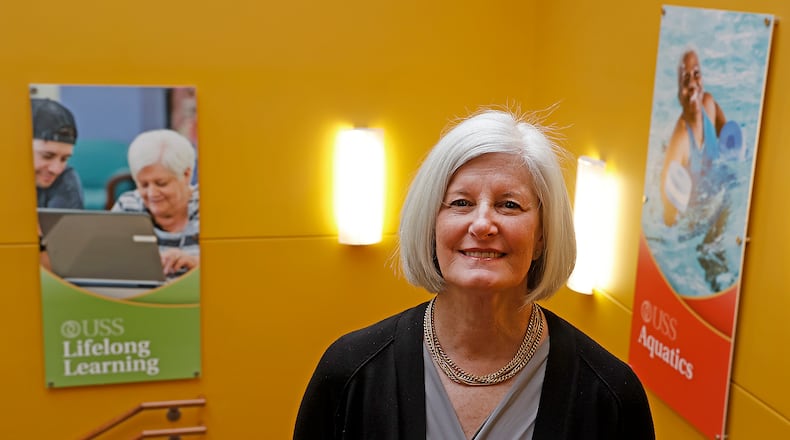USS Executive Director/CEO Maureen Fagans said research shows that every 39 seconds, a scammer connects with a mark, worldwide.
Monica Spencer serves as director of Caring Services, providing trusted advocacy for seniors to ensure their safety and security. She is seeing increasing financial fraud endangering the well-being of those over age 60 in the Clark County community.
While seniors have often been targeted by telephone solicitation scams on their landline phones, with the advent of cell phones and internet activity, there are “so many more opportunities for someone to get to an older person.”
Spencer noted most of the online fraud currently seen in the local community originates from oversees.
Fagans added anyone can fall victim to a scam.
“We all believe this will never happen to us because we’re so certain we understand the risks. And yet we see highly competent, smart, educated people lose their life savings to a criminal,” she said.
Older people can be more at risk because they are isolated, lonely or feel a need for attention.
Among the most vulnerable are the recently widowed. Fagans said those who are lonely long to “have someone who is kind to you, seems to care for you, and wants to talk with you on the other end of the phone.”
Spencer said the victims share the same story of being called endearing names, like ‘sweetheart,’ ‘honey,” “darling.”
“Scammers inundate them with attention,” Spencer said, “sometimes calling them morning, noon and night. They take every call and become exhausted. They are told not to tell anyone about the calls. They hide this from their family members.”
The two cited an example that came to their attention when they were contacted by a UPS staff member who became concerned about a woman who brought in several shoeboxes and sent them to the same address. When her daughter-in-law had asked about the boxes, the woman told her she was returning items she’d bought on the internet. In truth, the boxes were full of cash being sent to the scammer she’d been conducting online communication with for months.
“The internet has made us all more susceptible because of the information that it makes available about us — the way we vote, whether we have just lost a spouse, where we live, the value of our home, whether we’ve made sizable charitable donations - all of that information is available online to anyone, including the bad guys,” Fagans warned.
Spencer has established working relationships throughout the community with bankers, social workers, the police and others who contact her if they suspect someone is in danger of being victimized.
USS offers educational programs on how to protect yourself from scams. She offered red flag warning signs for a variety of scam scenarios, including romance scams, which often originate on social media sites.
Beware when:
- A new friend or romantic interest sends a picture that looks more like a magazine model than a regular snapshot.
- They want to move communication with you away from the social media site to communicate directly.
- In most situations, Spencer said, all communications occur by text, never FaceTime.
- While they promise to meet you in person, there are always excuses and it never happens.
USS suggests protecting yourself by:
-Taking it slowly and asking a lot of questions. Listen well and watch for inconsistencies that might reveal the person to be an imposter.
- Check the photo using “search by image” on Google to see if the picture shows up elsewhere with a different name attached to it, a sign the scammer may have stolen it.
- Be wary of flirtatious and overly complimentary emails. Copy and paste the text into a search engine to see if the same words show up on websites dedicated to exposing romance scams.
- Cut off contact immediately if you suspect the individual may be a swindler.
- Notify the dating site, messaging site, dating app or online community on which you meet the scammer.
According to USS, never:
- Assume because you were the first to make contact that the person on a website or dating site is not a scammer. Swindlers flood websites with fake profiles and assumed identities and wait for victims to come to them.
- Reveal too much personal information to someone you’ve chatted with only online.
- Provide intimate photos to an online acquaintance that could later be used for extortion.
- Send cash or a reloadable gift card to someone you’ve only chatted with online. You will never get that money back.
United Senior Services can be reached by calling (937) 323-4948, visiting the website at unitedseniorservices.org or at 125 W. Main St.
USS works closely the Elder Justice Unit of the Ohio Attorney General’s Office in efforts to educate and protect older Ohioans from cyber exploitation. The following telephone numbers offer good resources for those who believe they might have been victimized.
Ohio Attorney General (financial fraud/exploitation, scams)
1-800-282-0515
Federal Trade Commission (Identify theft)
1-877-382-4357
Credit Freeze (Credit Card Fraud)
Equifax: 1-800-525-6285
Experian: 1-888-397-3742
Trans Union: 1-800-680-7289
Credit Report Check (Credit Card Fraud)
1-877-322-8228
Credit: Bill Lackey
Credit: Bill Lackey
About the Author

